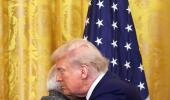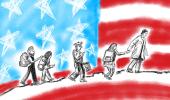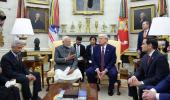The US is currently Earth's most powerful country and a certain latitude of understanding -- a world view -- is popularly expected from its leadership.
From a country identified with freedom, constitution, debate, democracy and the likes of Abraham Lincoln even as it had the most powerful military around, the US, following Trump's actions, seemed repositioned as militarily powerful with other qualities secondary, observes Shyam G Menon.

President Donald Trump wants Canada, the world's second biggest country by area, to be the fifty-first state of the United States.
Following through on his wish, in December 2024, the American president addressed the Canadian prime minister, Justin Trudeau, as governor.
Trump's immediate reasons for eyeing Canada appear to be illegal immigration and the smuggling of fentanyl. But there has also been imagination of what may be, should Canada, rich in natural resources, become a part of the US.
It is a paradigm, the core idea of which, the world of 2025 is no stranger to. We see pitches of the Canada sort, as daily reportage in business media.
Except, those pitches around mergers and acquisitions deal with companies, not a country treated as merchandise.
Canada is no pushover when viewed as a land with its own residents and sizable economy.
What lends Trump's Canada project a level of seriousness, is US military might (considerably bigger than Canada's) and the scale of America's influence worldwide. Trump has said that he is not in favour of deploying US military might against Canada.
Flexing muscle
As it turned out, the Canada episode wasn't the sole display of imperious attitudes by the Trump administration in the twenty-first century, aka the Asian Century; a century of US power forecast to recede.
Illegal immigration and fentanyl also powered the US diplomatic confrontation with Mexico in the wake of Trump's second coming as president.
After Trump lashed out against uncontrolled immigration, America's southern neighbour dispatched additional troops to its border with the US to further check illegal influx.
Both Canada and Mexico -- the two are among major trading partners of the US -- were threatened with punitive tariffs since disclosed as held back for a month because the countries appeared to respond to US demands.
Panama, located south of Mexico and home to the Panama Canal linking the Atlantic and Pacific oceans was also told to fall in line by Trump.
The Panama Canal is crucial for container ships moving from the US west coast to the east coast and vice versa as well as similar movement by the US Navy.
Trump was unhappy with the transit-fees charged and growing Chinese influence in the area.
The concerns raised by Trump are not trivial. But his solution for problems seems rooted in flexing American muscle, marketable optics and brinkmanship.
Canada as fifty-first state of the US devolved into the realm of entertainment given the unbelievable nature of the proposition.
Canadians spoke up and back to the US and the whole angle of becoming an American state was reported in the media to have rekindled Canadian patriotism.
Smaller, less powerful countries have a tough time. Panama denied US claims that it allowed free passage for US warships through the Panama Canal. But reports said, Panama was weighing whether to cancel its contract with a Hong Kong-based company, which operates ports near the Panama Canal.
When a planeload of illegal immigrants dispatched to Colombia was sent back from there, Trump hit the South American country with steep tariffs.
Dependent on the US for crucial imports, Colombia caved in quickly. Trump's tough stance on immigration and employment of foreigners in the US, had made India also nervous.
While the anxiety over work related visas eased after an initial panic, military planes carrying illegal immigrants reached India too.
The Indian government, which has taken the official position of being opposed to illegal immigration, was generally submissive in its response to the US despite news reports of many deportees shackled for the duration of the flights.

Compared to other countries, Greenland's land area is big and its population small. Trump, known well for his real estate business, cast his glance towards Greenland.
In the resultant pitch, he seemed to treat Greenland as just land; a location with a wealth of natural resources beneath and around, that would be valuable for the US to own/access.
There is a precedent in perspective of this scale. Alaska, currently a US state, was once part of Czarist Russia.
The Russians were keen to develop the area rich in natural resources but they neither had adequate people on the ground nor the capital to sustain such work.
On the other hand, the commercial growth of the US saw its people venture into the north western parts of North America.
In 1867, the Russians sold Alaska to the US for 7.2 million dollars. Alaska, which has no physical link to the US (the Canadian province of British Columbia comes in between) became the fiftieth state of the US.
Trump would have known that Denmark, under whose control Greenland is, offers no competition to the US when it comes to military might.
He didn't rule out the use of military in the case of bringing Greenland into America's orbit (he reserved a similar approach for the Panama Canal too).
The precedent of Alaska aside, there are traces of the past -- coincidence actually -- in the architecture of the Greenland episode. Greenland sits in the north Atlantic, to North America's east.
West of Alaska in North America's north-west, lay the northern part of the Pacific Ocean. Alaska and Russia are separated by the Bering Sea and therein, the Bering Strait.
The sea and the strait are named after Vitus Jonassen Bering (1681-1741) aka Ivan Ivanovich Bering, a cartographer and explorer, who was an officer in the Russian Navy.
Through a series of voyages, he explored the sea to the north east of Russia and established that there wasn't a shared land border between Russia and North America.
Bering was Danish by birth; he was born in Horsens in Denmark. Greenland, now in Trump's sights for a potential Alaska-like addition to the US, is an autonomous territory of Denmark.

No laughing matter
Both the idea of acquiring Greenland and Canada as fifty-first state were lampooned by American comedy shows.
In the distant past, provinces and colonies have been transacted insensitively.
Mumbai, where I am based, is itself an example. In 1661, as per the marriage treaty of Charles II of England and Catherine de Braganza, daughter of John IV of Portugal, the Seven Islands of Bombay and the port of Tangiers (in Morocco) were to be presented to the English Crown. But that gifting as dowry, was then.
The age of kings and the history of colonialism is rich in examples of people on the ground overlooked and parcels of their land traded and boundaries redrawn to troubled legacies persisting for years thereafter.
Notwithstanding the occasional relapse to imperial habits, the world has sought to correct its ways.
What amazes in the suggestion that Canada be an American state or that Greenland gravitate to US control and satisfy America's hunger for minerals, is Trump's willingness to table these suggestions despite the spot the US occupies at the apex of democracy and the modern world evolving post-colonial values.
Not to mention -- its position in the free world, a concept sacred to millions worldwide capable of imagination better than a game of Monopoly.
The insensitivity of Trump's proposals and they happening in the twenty-first century, make them comical. And yet, it doesn't seem entirely a matter to laugh over.
On February 7, 2025, Reuters reported that Trump's expression of interest was being seen as helpful by Greenland's pro-independence party in its push for independence from Denmark.
Not to mention -- if viewed solely through the prism of residents and what they wish for their land, the number of people to be influenced is small as Greenland, the world's biggest island, has a population of less than 60,000 people.
Meanwhile, Canadian Prime Minister Trudeau warned that Trump's threat of absorbing Canada into the US was real; Trump followed that up with a reassertion of his seriousness.
Laughter was however distinctly impossible with Trump's next target -- that tortured bit of land called the Gaza Strip, the scene of a bloody confrontation between the Hamas and Israeli security forces in 2023-2024, which left thousands, dead.
A manmade crisis, unexpectedly flaring-up with a bloody Hamas strike on Israeli soil in October 2023, Gaza had since been as much a case of war reportage as it was a procession of stories around a citizenry suffering for want of food, medicines and shelter.
On a larger scale of time, the problems faced by the Palestinian people have been treated in a cavalier fashion by the world at large.

Following a visit by Israeli Prime Minister Benjamin Netanyahu to Washington, DC, Trump spoke of shifting the Palestinians out of Gaza and developing that bombed out ghetto of a Palestinian territory into a posh piece of real estate on the eastern shore of the Mediterranean.
A Middle East riviera. The bizarreness of these recommendations, indifferent to Palestinian sentiments, stood out stark. And yet, this too may have a precedent.
Wasn't the West's reconstruction of Germany and Japan part of the aftermath of World War II? Hasn't the model been repeated in other wars fought by the US and other nations?
In the twenty-first century, the business of reconstruction is a well-entrenched option for the victorious and those partnering the victorious. America's plans for the Levant didn't end with Gaza's recommended rebirth as a Middle East riviera.
Trump proceeded to impose sanctions on the International Criminal Court for issuing an arrest warrant for Netanyahu, the leader of Israel, America's closest ally.
Like many contemporary Right-Wing politicians, Netanyahu has been a polarising figure on the world stage and more importantly, in his own country.
From the confines of the White House, that was a lot of muscle-flexing accomplished within a short while since president Trump's swearing-in.
It was a kick-off with a bang. In fact, on his first day in office, Trump signed more executive orders than any other American president in recent history.
Apart from the peculiar imagination of world and humanity inspiring these actions, the volley of statements and signing of new orders had a machine gun-fury to it.
The sheer torrent of controversial actions was hard to overlook, from within the US and from anywhere on the planet.
So much so that at the president's inauguration, a concerned bishop requested him to be considerate towards the queer community, who Trump has put under pressure with his official order recognising only two gender denominations.
The US is currently Earth's most powerful country and a certain latitude of understanding -- a world view -- is popularly expected from its leadership.
Even its decline, anticipated in the Asian Century, is hoped to be gradual; not sudden or in sharp plunges. Trump's actions had the effect of plunges.
From a country identified with freedom, constitution, debate, democracy and the likes of Abraham Lincoln even as it had the most powerful military around, the US, following Trump's actions, seemed repositioned as militarily powerful with other qualities secondary.
Warnings were voiced from within American politics that given the example Trump set showcasing his proximity to super-rich people and wealthy corporations, the US may witness the ascent of powerful business oligarchs.
It is a pattern, previously voiced in the context of post-Communist Russia and the political churn witnessed there.
A couple of decades ago, one would never have thought of Russia setting an example for the US to emulate.

Trump's punches were felt in other spheres as well. He pulled the US out of the Paris Agreement (international treaty on climate change) and the World Health Organisation.
Coupled with the known American view towards the United Nations, Trump may have pushed the world closer to a predicament losing room for international cooperation, especially on issues pertaining to the general good of humanity.
On February 6, reports in the media said that protests against the Trump administration had erupted in several US cities.
In our contemporary polarised world, Trump will have his supporters and critics. His supporters will praise his capacity for hard hitting statements and decisions.
They may even like his willingness to put the world on edge by having the most powerful country around behave in ways that are startling to a global population used to governments advocating peaceful coexistence and not confrontation as the main goal of being alive.
His critics will highlight how his actions misrepresent the idea of being the US. For instance, as the big fish in the capitalist pond and with purchases like Alaska to its credit, the US perspective towards Greenland -- as evinced by Trump -- would appear normal.
It is even pleasantly blunt having dispensed with the requirement for sensitivity and serving up instead a plan rooted in American materialism and strategic interests.
Minds used to market and money, and those weaned on world simplified by such instincts, will love it. But it will also underscore the lack of trust hereon in having the US as a partner unless -- as some in the US probably seek -- a distinction is drawn between the American public's view of the world and Trump's.
And strangely, to the extent such distinctions become necessary, the US becomes no better than many other countries currently saddled with administrations riding populist mandates and driving protective, inward-looking policies amenable for greatness by social media and justification by loyal cadres.
As capitalism finds itself challenged, these are also the bandwagons the super-rich of the planet (among Earth's most influential lobbies), worried about their fortunes, choose to be with. It's what makes this brew, a juggernaut on a roll.
The drama continues
In February, at a literature festival in southern India that I attended, several speakers described Donald Trump as unpredictable'.
That seemed correct. But in times of every aspect of existence weaponized, the context to his actions so far in his second coming as president, should also be noticed.
The first time he was president of the US, there wasn't a global ambiance lending legitimacy to his ways.
It is different in 2025. Not only has there been a growing number of Right-Wing administrations focused on nationalism around the world, but there is also the specter of some seasoned Right-Wing governments managing to hang on for long.
In a trait similar to autocratic Left-Wing governments, the recipe for the Right-Wing's survival now includes use of state power to keep itself afloat.
None of this, has been without templates for success generated alongside. Templates that seek to return to centerstage, with the help of contemporary image-making and PR technology, history's questionable title of golden age gifted to select periods.
Trump's advancement into his second presidency bears signs of templates seen elsewhere in recent times.
Make America Great Again (MAGA), as a political slogan and movement, is prominent in Trump's second presidency.
Similarly, extreme positions adopted and later watered down (examples: High tariffs announced and then held back) are among the easiest ways to make anybody, unreasonable folks included, seem compassionate and sagacious.
There are contemporary political personalities, whose commencement as insular, hardline-government have since given way to heavily marketed avatars of empathy and concern.
Also not to be ignored is how Trump's threats, even if unrealistic and unbelievable have the capacity to fan Right-Wing sentiments in the target country.
An example maybe Canada. Trump threatening and Trudeau saying the threat is real – all add up to nationalism (a cornerstone of Right-Wing mentality) in Canada.
Viewed so, even if Trump doesn't get Canada he helps grow the global Right-Wing movement.

Meanwhile, the drama continues. On February 11, 2025, news reports said Trump was considering import duties on steel and aluminum, a move that could disappoint India.
This, after India's 2025-2026 Budget slashed the import duty on motorcycles, a step widely seen as an attempt to placate Trump who had previously spoken of the difficulty Harley Davidson faced in the Indian market.
On February 10, 2025, the media reported that Trump had signed an official proclamation renaming the Gulf of Mexico as Gulf of America.
Once again, quite unilateral and likely to find takers. At the earlier mentioned literature festival, I had walked into a session concerning rain and ocean little knowing that it dealt with poetry, a craft I am not as fond of as prose. But it turned out to be very engaging.
One of the poets mentioned in passing how the oceans were owned by none and enjoyed by all. He meant it as a poet would.
When the time for audience-questions came, I heard a stern voice thunder, "How can you say the oceans don't belong to anyone? India owns the Indian Ocean!" Gulf of America would agree.
Shyam G Menon is a freelance journalist based in Mumbai.
Photographs curated by Manisha Kotian/Rediff.com
Feature Presentation: Rajesh Alva/Rediff.com











 © 2025
© 2025